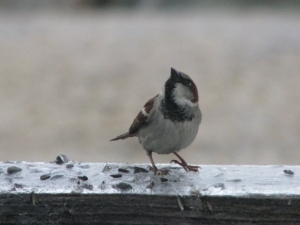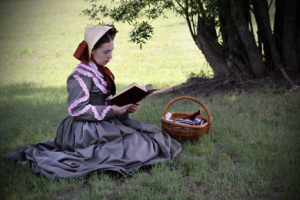Eldon Reed's Blog, page 2
November 12, 2015
The Window Between
 Here’s a little story written with interior monolog:
Here’s a little story written with interior monolog:
A sparrow has perched on a branch outside my window. I thought sparrows were ugly. I guess I never really studied one before. This one’s taupe-colored vest blends with its dark brown upper coat. The delicate top feathers flick up in the morning breeze. He looks around, unaware of my presence beyond the glass.
Dr. Hampton was just in talking to Carla about my condition. He said there was still hope, but to just take it a day at a time.
What kind of advice is that? Of course, we all take it a day at a time. I’ve never known anyone to skip any, although it’s not really a bad thought. I know one day last month I wish I could have skipped.
A couple of shingles had blown off our roof in a windstorm on Thursday. I’d nailed on a few thousand shingles before—nothing new—that’s my job. I own a local roofing company. What I didn’t account for was my pair of worn out, slick-soled sneakers on that eight in twelve pitch roof. I knew better, but my brain wasn’t engaged before climbing the ladder. The truth is I was ticked at something Carla had said.
It was early Friday morning. The roof was still a bit damp from the storm during the night. I made my way—one carefully placed foot at a time—up to near the top where a few shingles were missing. I slapped the replacement shingles down, stepped over the ridgeline to look for further damage on the back side of the roof. My feet began to slide. Then I started a tumble downward. I’d hoped to be able to grab at the edge of the roof and catch myself, but that didn’t happen. In that two-story fall—actually, three stories counting the walk-out basement—dozens of thoughts ran through my head. My wife, my kids, health insurance. Life insurance!
I woke up staring into the eyes of two doctors and a nurse—not a bad looking nurse at that. Just as I started to make some smart remark about my mishap, nothing came out. I tried to raise my hand, nothing happened.
Now the calendar on the wall in front of me says thirty-two days have passed since the accident. It was stupid on my part; one that could, and should have been avoided.
There is always a constant buzz of activity in the room—nurses checking those annoying beeping machines every ten minutes, orderlies sanitizing the bed rails, a sour-faced chaplain whispering a perfunctory prayer, doctors waltzing in and acting like they understand my condition. And then it starts all over with the changing of each shift.
My eyes are in a fixed stare, but I see them all, even when they are barely in my peripheral. They all think I am totally unaware. A few minutes ago two gals in pink smocks were standing in the corner of the room deep in what they probably believed was—and should have been—a private conversation. I wanted so badly to jump up and tell them I heard every disgusting word they uttered.
They finally left. The room was quiet. Boredom gave way to anger.
I’ve always been an in-charge kind of guy. If there’s a problem, I fix it. But—a little curse word slipped into my thought—I am helpless now!
I control nothing, not even my bladder. Here I am a thirty-two-year-old—my wife would say, handsome guy. I feel as if I’m tightly encased in a clear plastic straight jacket and displayed for all to gawk at and whisper. I want to scream, people, my ears work just fine! Whispering is senseless. Time is not my friend. Hours creep by, days turn to weeks, and I’m stuck in my mummified state.
Now my family is standing at the foot of my bed, along with our minister. If I could just communicate some way—somehow let them know I hear every word they say. If they could know I see every shaking head and every oozing tear on the faces of people I love.
Carla asked Dr. Hampton why my eyes would blink, even open and close. He smiled and told her it was just involuntary muscle reactions; you know the EEG shows a nearly flat line; there is little or no brain activity.
How stupid is that! That danged EEG machine must be broken! Check it again!
I feel fine. I see, I hear, I think just as rationally as ever—if they could only know. But all forms of communication are gone. How stinking long will I be like this?
The calendar on the wall says I’ve been here a little over two months—might as well be two decades. My brown-feathered friend is back, perched outside the window.
Right now Carla is standing by my side holding my hand and looking off into never-never land. What I wouldn’t give just to be able to ask her to forgive me for the times I allowed stupid anger to overcome my love for her. If I could tell her how picture-perfect she is in that chartreuse dress. Yeah, the one I used to hate. Or even tell her about that sparrow with the taupe-colored vest.
The bird is looking straight at me and cocks her head to one side. Then she pecks at the window. Does she know?
Eldon Reed ©2015
November 3, 2015
Stood Up Again!
Here I sit – alone. I’m glad I thought to bring along a book to read. I’ve brought freshly baked bread from the market, Coeur de Chevre cheese wrapped in a chestnut leaf and a bottle of his favorite wine. How could Patrick do this to me again? He said he’d be here. You’d think I’d learn and start searching for a new beau.
It’s such a beautiful day and so very few people in the park. Maybe no one will bring along their barking demons on leases. How I hate dogs! Cats are much more civilized.
Well, I’m here. The shade is refreshing. I have my lunch with me. I might as well enjoy it.
***
Aubrielle! Sweet Aubrielle. I know she’s out there waiting for me, thinking I have stood her up again. Indeed, I have stood her up. But how can I ever explain?
Nanette came into my life about six months before I met Aubrielle. I was lonely, depressed, and needed comfort. Nanette gave me that and so much more. Now she insists we be together at all times.
But sweet Aubrielle. I met her at the governor’s ball two weeks ago. She was stunningly beautiful in her sequined gown and pearls. But if she knew about Nanette… Well, to say the least, that would create a bit of a problem for me.
In many ways, Aubrielle and Nanette are alike. Both demand my full attention. Actually, it is more than that – much more. Both have a jealous nature, possessive, and uncompromising. I see it in their eyes.
So here I sit again beside my beautiful Nanette. I can’t leave her this time. Not now. She needs me. It all started about a week ago. First the coughing, then the fever. Poor Nanette. Surely the doctor could do more.
I had planned so much for us – hiking in the Alsace forest, swimming underneath the Cascade de Madeleine waterfall, frolicking in the park —
The park – Oh! My sweet Aubrielle. She’s out there now, waiting for my arrival. She’ll never forgive me.
A Carib grackle perched just outside the window, reminding me of the first one I saw on the beach in Marseille.
Nanaette is originally from Afghanistan, but we met on a beach in south France – Marseille, to be exact. Depression had pulled me back to the bottom rung on the ladder of life. It was Nanette who broke the bonds of my despair.
But here I sit by her bed, running my fingers through her long gorgeous blond hair, picturing it furling out from behind like a flag when we did our morning jog, as we always did. Her eyes, once glistening ebony like polished marbles, are now drab and longing. How could her health have deteriorated so quickly? I asked the doctor about her prognosis. All he would say was, we just don’t know. But it’s possible she could bounce back and surprise us all.
My poor Nanette; no I can’t possibly leave her bedside.
But then I know Aubrielle, sitting there under our favorite tree in the city park, anticipates my arrival. Why couldn’t I have been honest with her? I’m such a fool Now I may lose both Aubrielle and Nanette.
But wait! Nanette is sitting up, smiling at me. I feel her forehead; the fever is gone. This is amazing! I start to run my fingers through her long blond hair. To my surprise, she looks at me, bounces up from her bed and encourages me to come go for our morning jog.
A jog! You have got to be kidding!
This is miraculous! But then, wasn’t this what her doctor was talking about when he said, Afghan hounds are resilient like that. Sometimes they surprise us and bounce back quickly.
Enjoy the journey!
Eldon
Eldon Reed c2015
Photo: Carl Soerens
October 26, 2015
Plotter or Pantser?
In fiction writing circles we talk about two different kinds of writers: outliners, sometimes called plotters, and seat-of-the-pants writers, or pantsers. Of course a writer may be a little of both. Usually he will fall into one or the other. A writer who is an outliner (plotter) begins by thinking through a story and writing a beginning, middle, and ending. A true outliner will further break those sections down to chapters and even scenes. That writer tries to follow his outline, allowing only a bit of creative spontaneity during scenes.
A seat-of-the-pants writer—we call them pantsers—will normally start with a basic idea for a story. He will always know where he wants to start and will sometimes know how he wants the novel to end. Having a middle in mind will certainly be to his advantage. Without a preconceived middle, writers new to fiction will almost always see their novel petering out somewhere around the 30,000 – 40,000 word level. A pantser allows the story to unfold as he writes.
Possibly the most notable pantser is Stephen King. Romance author Jane Graves, an avowed pantser says, “I’m cursed with not being able to see the good twists and turns of a character and plot until I’m in the middle of writing the book.”
On the other hand, an outline will help a writer focus, fights fear, prevents sagging middles, and helps to be able to write faster.
It is possible that plotters have gotten a bad name. They are afraid to admit that outlining works best for them for fear the public will see them as lacking in creativity. As a result, many plotters will never admit their method of writing.
Of course any writer knows he has to go with what method works for him. If plotting isn’t working for you, try the other method.
So, whatever your style is, plotter or pantser, there is a definite formula for good engaging fiction.
Bestselling author, Dean Koontz (also a pantser), puts it this way:
The perfect structure for any novel
Plunge your main character into terrible trouble as soon as possible. (That trouble will mean something different depending on your genre. For a thriller it might be life-threatening. For a romance it might mean choosing between two suitors.)
Everything your character does to try to get out of the trouble makes it only worse.
Eventually things appear hopeless.
Finally, everything your character has learned through all that trouble gives him what he needs to personally conquer the opposition.
That’s a structure that will keep you—and your reader—engaged and insured against boredom.
And that’s how to outline a novel, whether you’re an Outliner or a Pantser.
Maybe it doesn’t really matter which writing method is best, as long as it works for you, the writer. And as long as it keeps the reader engaged to the end.
Enjoy the journey
Eldon
October 16, 2015
Yes, I Robbed a Bank – my current project and how you can help
Will it be a short story or a novella? I’m aiming for a novella, but we’ll see. 
Yes, I Robbed a Bank is set in the 1930’s in what became known as the Dust Bowl, a 150,000 square mile area mostly in the Oklahoma and Texas Panhandles, but also reaching into parts of New Mexico, Kansas and Colorado. A severe and extended drought, amplified by high winds, caused “black blizzards” to come rolling in, covering good fertile farmland in several inches (sometimes feet) of brown powdery dust from the north.
Here’s an excerpt from what I’m working on:
“The year was 1936. Crops were ruined. There wasn’t a well-fed cow in three hundred miles. Most were a pile of bones under mountainous dust drifts. Home pantries from years past were bare. Desperate people do desperate things.”
“I was no exception. Wife and four hungry kids and no job.”
This could not have come at a worse time in history: the Great Depression. By 1940, two and a half million people had fled the Great Plains, with some 200,000 relocating to California.
John Steinbeck’s The Grapes of Wrath details the hardships of people from the Dust Bowl. Yes, I Robbed a Bank will be different from Steinbeck’s novels. First of all, I will not draw the tale out to nine hundred pages; secondly, I refuse to use the crass language (however accurate in many cases) Steinbeck splattered the pages of his story with.
I’m writing this novella because that era in our history fascinates me. I grew up in the Texas Panhandle, in the little town of Stinnett, northeast of Amarillo. The “black blizzards”, were mostly over. I do, however, remember one rolling in while I was taking my driving test. The officer suggested I pull over and wait it out. I’m glad I did, because all vision beyond the hood of my car was soon gone.
The people living through that awful period in time were strong, hardworking, neighbors helping neighbors, families sticking together. For many, their faith was what saw them through all of their troubles. Do we see some of those qualities lacking in our country today?
Yes, I admire those people. In writing this little tale, I am trying to keep true to those families. I don’t mean to exaggerate for the sake of drama, but with the Dust Bowl and Great Depression long gone, it may seem somewhat of a hyperbole to the younger generation.
You can have a part in this little tale in progress. I’d love to hear from you. I won’t use your name. And I won’t quote you exactly, but I may use bits and pieces of your story. You can comment below. Or better yet, just e-mail me at: eldon@eldonreed.com
Enjoy the journey!
Eldon




